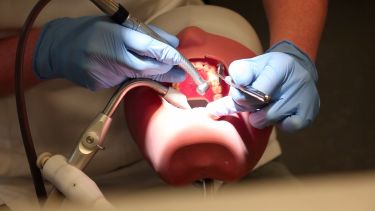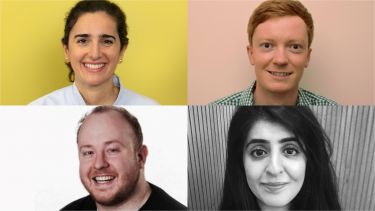James Bird, Hanya Mahmood, Christopher Donnell and Joana Monteiro all successfully applied for funding from the last month. James, Chris and Joana were awarded Pump-Priming grants, while Hanya was awarded a Research Fellowship.
We asked each recipient to tell us more about their awards and upcoming projects:
James Bird - FDS Pump-Priming Grant
"There are almost 1.5 million adults with learning disabilities in the UK yet there are many unanswered questions about the oral health of this group. This grant will fund a project in which we will work with people with learning disabilities to develop an accessible questionnaire for measuring oral health-related quality of life of people with learning disabilities. We will interview people with learning disabilities as well as close family members and carers to find out more about how problems with the mouth impact their daily lives.
"I am very grateful to have received this award and I am really looking forward to getting started!"
Hanya Mahmood - FDS-ABAOMS Research Fellowship
"This award will fund a one-year project for ‘Single-cell sequencing and spatial biomarker analysis in oral epithelial dysplasia’. This work complements my ongoing research in early oral cancer detection. The project will use a state-of-the art technique that integrates cell biology, software algorithms and precision imaging to identify, visualise, and quantify new spatial genomic markers in oral epithelial dysplasia and correlate them to clinical outcomes. The discovery of new spatial gene expressions will help improve the understanding of oral dysplasia progression to malignancy and could provide patients and clinicians with objective genomic information to improve risk stratification of lesions.
"I feel fortunate to have received this award and thank the Faculty of Dental Surgery and the Association of British Academic Oral and Maxillofacial Surgeons for the opportunity to undertake this exciting and important work."
Christopher Donnell - FDS-BSPD Pump-Priming Grant
"Molar incisor hypomineralisation (MIH) is a condition which affects the enamel of approximately one million children in the UK. MIH is usually noticed when the adult incisors and molars come into the mouth around age 6-7. Dental problems associated with MIH are very common. Although some public awareness of MIH exists, overall understanding is poor even amongst healthcare professionals and parents report there is a distinct lack of information pitched at the family level. This project aims to fill that information gap, by co-creating information resources ‘for-patients, by-patients’ for MIH.
"It is a privilege to be chosen to receive this grant and co-create the information resources families of children with MIH are actively seeking on a daily basis. To join the prestigious list of previous winners of the joint RCS-BSPD award is a huge honour and one I hope is the first step towards a career in clinical academia."
Joana Monteiro - FDS Pump-Priming Grant
"Children with MIH can experience extreme dental hypersensitivity (DH), which may impact negatively on their quality of life. However, tests used to measure DH have mostly been adapted from adult research. There is a real need to better understand how children experience DH so we can manage their symptoms better. We will invite around 150 children with MIH, aged 6-16 years, to undertake this study. We hope to interview children about DH, then develop and evaluate a new child-friendly questionnaire to measure how DH impacts on children with MIH, before and after treatment.
"I am delighted to have received this grant, which will be invaluable. It is an honour to have been chosen by the Royal College to develop my research."
Professor Cheryl Miller, Faculty Lead for Early Career Researchers and Department Director of Research and Innovation at the School of Clinical Dentistry, said: "We are immensely proud of our early career clinical researchers that have had a string of successes in the recent Royal College of Surgeons' Faculty of Dental Surgery's research awards. These highly prestigious awards will aid our clinical researchers to develop their independent research careers and secure future funding and in turn senior clinical academic positions".


